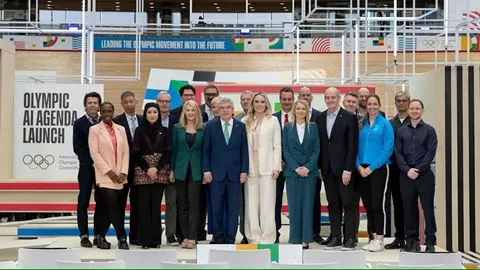19 April 2024 – In a ground-breaking initiative, the International Olympic Committee (IOC) today launched the Olympic AI Agenda. The initiative was introduced at a press conference held at the IOC headquarters in Lausanne, Switzerland, and was met with great enthusiasm and anticipation from the global community.
The Olympic AI Agenda aims to integrate artificial intelligence (AI) into all aspects of the Olympic Games, from planning and organization to competition and performance analysis. This move comes as a result of the increasing role of technology in sports and the need for constant innovation to keep up with the ever-evolving landscape of sports.
At the press conference, IOC President Thomas Bach stated, “The Olympic AI Agenda is a testament to our commitment to embrace technology and use it to enhance the Olympic Games. We believe that AI has the potential to revolutionize the way we approach sports and we are excited to see its impact on the world’s biggest sporting event.”
The Olympic AI Agenda will be implemented in three phases, with the first phase focusing on the use of AI in planning and organizing the Games. This includes using AI algorithms to analyze data and make predictions about ticket sales, transportation, and accommodation needs. This will not only improve the overall efficiency of the Games but also ensure a better experience for athletes, spectators, and officials.
The second phase will see the integration of AI in competition and performance analysis. This will involve the use of AI-powered cameras and sensors to track and analyze athletes’ movements, providing coaches and athletes with valuable insights and feedback. This will not only help athletes improve their performance but also make the judging process more accurate and fair.
The final phase of the Olympic AI Agenda will focus on enhancing the overall spectator experience. This will include the use of AI-powered virtual reality (VR) technology to provide viewers with a more immersive and interactive experience. Spectators will be able to experience the Games from the perspective of their favorite athletes, giving them a unique and unforgettable experience.
The launch of the Olympic AI Agenda has been met with excitement and support from athletes, coaches, and fans around the world. Olympic gold medalist and world-renowned sprinter, Usain Bolt, expressed his enthusiasm for the initiative, stating, “I am excited to see how AI will be integrated into the Olympic Games. As an athlete, I know the importance of constantly improving and pushing boundaries, and I believe AI will help us do just that.”
The Olympic AI Agenda has also received praise for its potential to level the playing field for athletes from developing countries. With the use of AI in performance analysis, athletes from these countries will have access to the same technology and resources as their counterparts from more developed nations, giving them a fair chance to compete at the highest level.
The IOC has also announced that they will be collaborating with leading AI companies and experts to ensure the successful implementation of the Olympic AI Agenda. This includes partnerships with companies such as Google, IBM, and Microsoft, who have already made significant contributions to the development of AI technology.
The launch of the Olympic AI Agenda marks a significant milestone in the history of the Olympic Games. It not only showcases the IOC’s commitment to innovation and progress but also sets a precedent for the use of AI in sports. The potential benefits of this initiative are endless, and we can only imagine the impact it will have on future Olympic Games.
As we look forward to the 2028 Olympic Games in Los Angeles, we can only imagine the advancements in AI technology and the potential it holds for the world of sports. The Olympic AI Agenda has set the stage for a new era of sports, one that embraces technology and uses it to enhance the Olympic experience for all. Let us all join hands and support this initiative, as we witness the power of AI in shaping the future of the Olympic Games.



